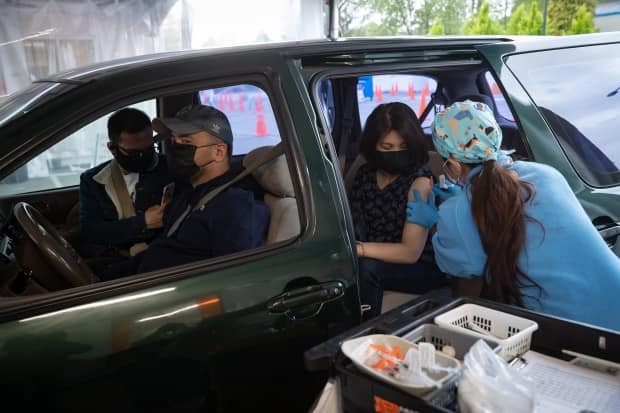B.C. reports first case of rare blood-clotting disorder after receiving AstraZeneca vaccine

B.C. has recorded its first case of a vaccine-induced thrombosis related to the AstraZeneca vaccine, a rare side effect of what health officials are still calling a highly effective vaccine.
Provincial Health Dr. Bonnie Henry and Health Minister Adrian Dix made the announcement in a news conference in the Fraser Health region on Thursday — while also announcing 694 new cases of COVID-19 and one additional death on Thursday, a one-day increase, despite cases generally trending downward over the last few weeks.
Henry said the affected woman who was in her 40s and in the Vancouver Coastal Health region is now stable, emphasizing the condition is extremely rare and can be treated. She said the woman noticed her symptoms five or six days after receiving a dose of AstraZeneca and went to her doctor, who, suspecting it might be a condition related to the vaccine, conducted a diagnostic blood test.
Symptoms to the rare side effect include a headache and swelling or redness in a limb. But Henry emphasized the AstraZeneca vaccine is safe, and has been used to curb major increases in cases in places like the U.K. and Whistler.
"It is an excellent vaccine. Take a deep breath and be assured this is rare and physicians know what to do," she said.
Henry said significant doses of Pfizer and Moderna doses are arriving soon, and far fewer doses of AstraZeneca, though, she said, the AstraZeneca vaccine remains an important part of the B.C.'s vaccine rollout.
Thursday's news conference comes after the province recorded 572 new cases on Wednesday — the lowest daily new case numbers in B.C. since March 20 — and no deaths.
Hospitalizations on Thursday are now at 457, the lowest number since April 20. The figures are positive signs as British Columbia continues its battle against the third wave of the novel coronavirus, and Dix said the dropping numbers of patients in hospital is "a huge relief" to health-care workers, though previously cancelled non-urgent surgeries cannot yet be rebooked.
Vaccine rollout
Henry said that by end of day on Thursday, B.C. will administer its two millionth dose of vaccine. She said the province will soon look at reducing the gap between the first and second doses given a rapidly increasing supply of doses.
People in B.C. aged 49 and above can now receive a vaccine. Dix said B.C. will be rapidly dropping the age eligibility for vaccination and encourage all adults in B.C. to register online.
"We're going to be moving through the age cohorts very quickly, particularly in hot spot areas," said Dix.
Henry said the province is currently looking at how to rapidly vaccinate a large number of people living in COVID-19 hot- spot areas like Surrey.
Henry confirmed Wednesday that teens will now be part of B.C.'s immunization plan after Health Canada approved the Pfizer COVID-19 vaccine for people as young as 12.
Henry said about 300,000 people between the ages of 12 and 17 in B.C. will now be eligible to receive vaccines, possibly before the end of the school year, although the details are still being worked out.
Currently, anyone 18 and older in British Columbia can register for their vaccination now if they have not already done so. This can be done online through the "Get Vaccinated" portal, by calling 1-833-838-2323, or in person at any Service B.C. location.
The province also announced earlier this week that pregnant British Columbians aged 16 and older are now eligible to book a shot.
Restrictions remain
To help curtail the spread of COVID-19, the B.C. government has restricted non-essential travel between provincial health regions and those restrictions remain in place until the end of the May 24 long weekend.
Residents cannot book accommodations or camping sites outside their zone and BC Ferries has stopped accepting bookings for recreational vehicles such as campers and trailers.
A list of travel reasons that are considered essential is available on the government's website.
Police are setting up roadblocks at access points to health regions and people who disobey the current travel order can be fined.
[

